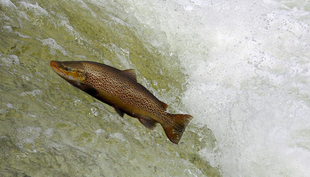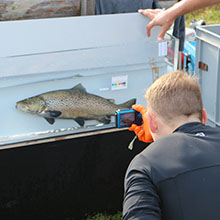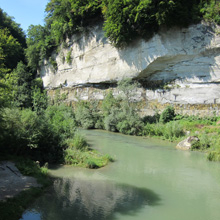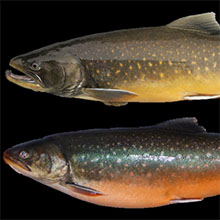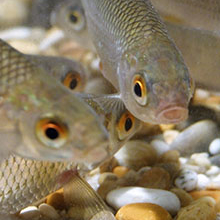Department Fish Ecology and Evolution
River Fish Ecology
In the River Fish Ecology group, we study the ecology and evolution of fish mostly in riverine ecosystems. We are working in the interface between ecology and evolution, realizing that these two traditionally separated disciplines are closely interdependent. More specifically, we are working with local adaptation, adaptive and neutral diversification, fish migration and river fish biodiversity on genetic, phenotypic, population and community levels. We are with our work ultimately aiming to study the interactions and potential feedbacks between ecology and evolution.
For our work, we are using multiple study systems, but are mainly focusing on Swiss streams and rivers and on aquatic ecosystems in Southern Greenland. The Swiss rivers harbor a very high biodiversity and biocomplexity due to the combination of Switzerland containing head streams of several major European rivers (i.e. Rhine, Rhone, Po and Danube), a high altitudinal gradient and a high gradient in size of the river from small creeks to large slow flowing rivers. Additionally, many fish species show high degree of intraspecific variation in their morphological, ecological and behavioral phenotypes, such as in their migratory patterns.
Since fish in Swiss rivers are heavily affected by multiple natural environmental variable along with multiple anthropogenic stressors, it is often difficult to unravel questions about cause and effect. Here, also our research on salmonid migration and ecological and evolutionary diversification in Southern Greenland serves as an important reference system. Due to its simplicity, its very low anthropogenic influence and high degree of replication, this system also offers a possibility to study some of the most fundamental question in evolutionary ecology.
We have strong interest in different types of animal movement, and put particular focus on fish migration. In most migration study systems, e.g. in bird migration, large mammal migration and migrations of oceanic fish and mammals, movements occur over vast distances with open borders and little natural replication. Hence, differences between migratory populations have most often been descriptive or focusing on intra-population variation and only rarely been studied with replication on population level. However, fish migrations are often replicated across multiple populations, e.g. from different river systems, making them a perfect study system for exploring fundamental questions about intra- and inter-population variation in migration.
Major Themes:
- Partial and differential migration
- Ecological diversification and adaptive radiation
- Assessment of fish biodiversity


